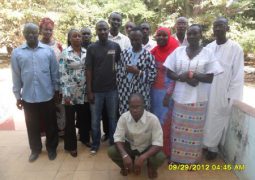As part of activities of their summer school, participants of the Global Unification Summer School 2010 recently embarked on an excursion to the historical
The excursion, which was sponsored by the National Environment Agency, was meant to expose the kids to the beautiful national flora and fauna, which is relevant to their social and history studies.
The students and their instructors visited a number of nature reserves, including the bird sanctuary, and the reptile farm in Madina Salam. They were welcomed, and taken on a conducted tour of the farm, where they were exposed to the difference species of reptiles.
The team was introduced to the mode of breeding and the habitat of the different species of snakes, many of which are now endangered species. They learned about the harmful and the harmless reptiles, as well as the safety precautions and first aid treatment for a snake bite.
Luc Paziaud, the proprietor of the reptile farm, said that The Gambia is endowed with a large population of reptiles, but that due to changing climate and human interference, the country is gradually losing that large population of the creatures. He advised the students to develop the culture of love for nature, and to do everything possible to protect the country's fauna and flora.
From the reptile farm, the group proceeded to Kartong village where they visited the famous Mama Folonko sacred site and a bird sanctuary research centre. The bird sanctuary is run by a British national called Collin Cross, who explained that the centre was set up for research on migratory birds.
He added: "Here in Kartong, we embark on a community-driven programme to promote Kartong not only as a historical village, but also as bird watchers' paradise that will return a lot of financial benefits to the community". The tour ended with the group's visit to mangrove swarms at the outskirts of the village.
Speaking at end of the tour, the summer school deputy programme coordinator, Jalika Keita, expressed delight at the success of the excursion. "It provided us the opportunity to learn about biodiversity and how to sustainably use nature and natural assets," she remarked. Ms. Keita also expressed her satisfaction with the logistics of the whole summer school programme, and the excursion in particular.
She thanked the National Environment Agency for their immense support to the association and the excursion, in particular, adding that without them the programme would not have been a success.
The excursion marked the end of the summer school programme, whose closing ceremony was held at



